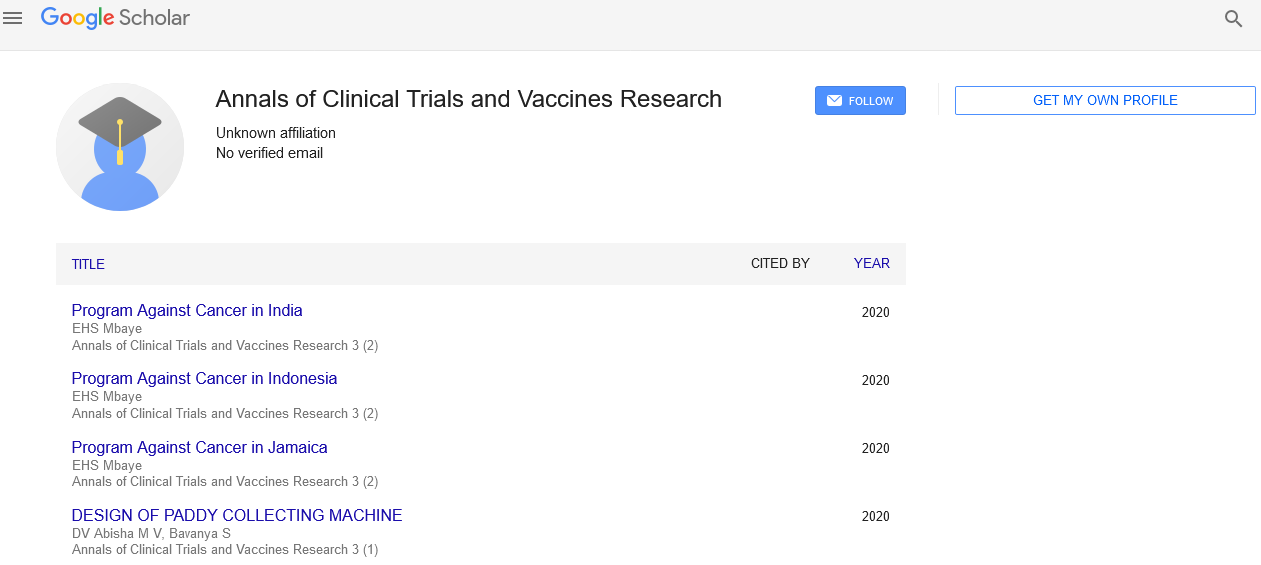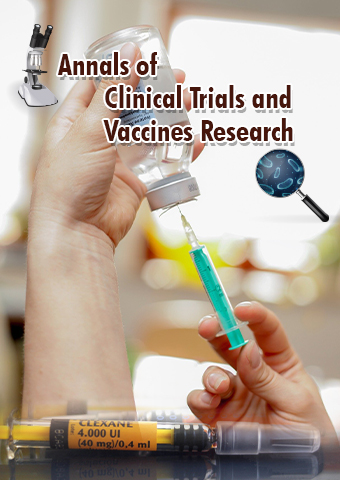Editorial - Annals of Clinical Trials and Vaccines Research (2023) Volume 13, Issue 3
Advancing Medical Breakthroughs: The Vital Role of Clinical Trials
Henry James*
Department of Pharmaceutics, DIT University, India
Department of Pharmaceutics, DIT University, India
E-mail: james67@gmail.com
Received: 01-June-2023, Manuscript No. actvr-23-100023; Editor assigned: 05- June -2023, PreQC No. actvr-23-100023 (PQ); Reviewed: 19- June -2023, QC No. actvr-23-100023; Revised: 21- June -2023, Manuscript No. actvr-23-100023 (R); Published: 28- June -2023; DOI: 10.37532/ ACTVR.2023.13(3).104-106
Abstract
Clinical trials play a vital role in advancing medical knowledge and improving patient care. These trials are rigorous and carefully designed studies that aim to evaluate the safety and effectiveness of new drugs, treatments, or medical devices before they can be approved for widespread use. They are conducted under strict guidelines and regulations to ensure the protection of participants and the integrity of the data collected. The process of a clinical trial typically begins with preclinical research, where scientists perform laboratory experiments and animal studies to gather preliminary data on the potential benefits and risks of a new intervention. If the results are promising, researchers can move forward to the next stage, which involves recruiting human volunteers to participate in the trial.
Introduction
Clinical trials are typically conducted in several phases. Phase 1 trials focus on a small group of healthy volunteers and primarily aim to evaluate the safety and dosage of the intervention. If the results are positive, the trial progresses to Phase 2, which involves a larger group of patients who have the condition or disease being targeted. In this phase, researchers gather more data on the treatment’s effectiveness and potential side effects. Phase 3 trials are the final and largest phase of clinical trials. They involve a larger population of patients and compare the new intervention to existing treatments or placebos to determine its effectiveness, safety, and potential benefits compared to standard care. These trials provide the most comprehensive data and are crucial in determining whether a new treatment should be approved for widespread [1,2].
Clinical trials also offer a platform to explore personalized medicine approaches. By incorporating genetic information and other biomarkers, researchers can identify patient subgroups that may respond differently to the treatment, leading to more targeted and effective interventions. This tailored approach holds the potential to optimize patient outcomes and minimize adverse reactions, ushering in an era of precision medicine. While clinical trials hold great promise, they are not without challenges. Long study durations, stringent regulatory requirements, and financial constraints can impede the progress of trials. Moreover, unexpected adverse events or insufficient recruitment can hamper the completion of a study. However, the scientific community continues to address these challenges by promoting collaboration, streamlining regulatory processes, and leveraging technological advancements to facilitate data collection and analysis [3-5].
Discussion
Throughout the trial, participants are closely monitored by medical professionals to ensure their safety and well-being. They undergo regular check-ups, tests, and assessments to evaluate the intervention’s impact on their health. Ethical considerations, such as informed consent and patient confidentiality, are strictly adhered to, and an independent ethics committee oversees the trial to protect the rights and welfare of the participants. The results of clinical trials are meticulously analyzed, and the data collected is submitted to regulatory authorities, such as the Food and Drug Administration (FDA), for review. If the intervention demonstrates significant benefits and an acceptable safety profile, it may be granted approval for use in the general population [6].
Clinical trials are essential for advancing medical knowledge, discovering new treatments, and improving patient outcomes. They provide a scientific foundation for evidence-based medicine and allow healthcare providers to make informed decisions about the best treatment options for their patients. While the process can be lengthy and complex, clinical trials are a crucial step in ensuring the development of safe and effective interventions that can make a positive impact on public health. In the realm of medical research and development, clinical trials play a pivotal role in driving scientific progress and bringing innovative treatments to those in need. These trials serve as the crucial bridge between promising laboratory discoveries and their application in real-world patient care. By evaluating the safety and efficacy of new interventions, clinical trials hold the potential to revolutionize healthcare and transform lives.
At the core of a clinical trial lies a meticulously designed protocol that outlines the methodology and objectives of the study. These protocols are formulated by a multidisciplinary team of scientists, physicians, and statisticians who collaborate to ensure rigorous scientific standards and ethical considerations. The study is typically divided into several phases, each with its specific purpose and research questions. During the initial phases, researchers aim to determine the safety, dosage, and potential side effects of the experimental treatment in a small group of volunteers [7-9]. These studies, known as Phase I trials, provide invaluable insights into the drug’s pharmacokinetics and potential risks. If the treatment exhibits a favorable safety profile, the trial progresses to where researchers evaluate its effectiveness in a larger cohort of patients.
Phase III trials, the most extensive phase, involve a considerably larger patient population and aim to establish the treatment’s superiority, non-inferiority, or equivalence compared to existing standard therapies. Randomized controlled trials (RCTs) are commonly employed during this phase to minimize biases and ensure reliable results. This rigorous evaluation of efficacy, coupled with long-term safety monitoring, provides the evidence necessary for regulatory authorities to grant approval for the treatment’s widespread use. The importance of participant recruitment and retention cannot be overstated in clinical trials. Researchers rely on the willingness of individuals to volunteer as study participants, contributing to the advancement of medical knowledge. Participants, often patients with the condition under investigation, altruistically offer their time and dedication to benefit future generations. Ethical considerations, such as informed consent and strict adherence to privacy regulations, are central to the recruitment process; ensuring participants’ rights and well-being are protected [10].
Conclusion
In conclusion, clinical trials are the cornerstone of medical progress, fueling the development of breakthrough treatments and reshaping the landscape of healthcare. By adhering to rigorous scientific standards and ethical principles, these trials generate valuable evidence that guides clinical decisionmaking and enhances patient care. As we embark on an era of unprecedented medical innovation, the ongoing commitment to advancing clinical trials will remain essential in bringing hope and healing to millions of people worldwide.
References
- Sun J, He WT, Wang L et al. COVID-19, epidemiology, evolution, and cross-disciplinary perspectives. Trends Mol Med. 26,483 (2020).
- Li Q, Guan X, Wu P et al. Early transmission dynamics in Wuhan, China, of novel coronavirus-infected pneumonia. NEJM. 382,1199-1207 (2020).
- Mohebali M. Visceral leishmaniasis in Iran, review of the epidemiological and clinical features. Iran J Parasitol. 8,348-358 (2013).
- Mohebali M, Hajjaran H, Hamzavi Y et al. Epidemiological aspects of canine visceral leishmaniosis in the Islamic Republic of Iran. Vet Parasitol. 129,243-251 (2005).
- Shafiei R, Mohebali M, Akhoundi B et al. Emergence of co-infection of visceral leishmaniasis in HIV-positive patients in northeast Iran. Travel Med Infect Dis. 12,173-178 (2014).
- Topno RK, Das VNR, Ranjan A et al. Asymptomatic infection with visceral leishmaniasis in a disease-endemic area in Bihar, India. Am J Trop Med Hyg. 83,502-506 (2010).
- Zhou P, Liu Z, Chen Y et al. Bacterial and fungal infections in COVID-19 patientsn. Infect Control Hosp Epidemiol. 4,1124-1125 (2020).
- Viney ME, Graham AL. Patterns and processes in parasite co-infection. Adv Parasitol. 82,321-369 (2013).
- Sundar S, Rai M. Laboratory diagnosis of visceral leishmaniasis. Clin Vaccine Immunol. 9,951-958 (2002).
- Dalgiç B, Dursun I, Akyol G et al. A case of visceral leishmaniasis misdiagnosed as autoimmune hepatitis. TurkJGastroenterol. 16,52-53 (2005).
Google Scholar, Crossref, Indexed at
Google Scholar, Crossref, Indexed at
Google Scholar, Crossref, Indexed at
Google Scholar, Crossref, Indexed at
Google Scholar, Crossref, Indexed at
Google Scholar, Crossref, Indexed at
Google Scholar, Crossref, Indexed at
Google Scholar, Crossref, Indexed at

